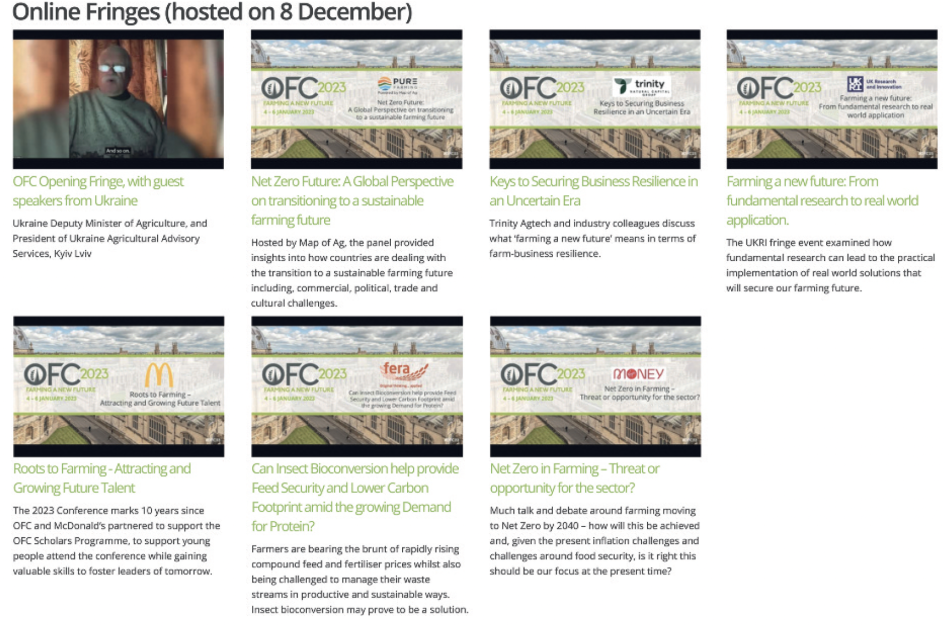4-6 January 2023. Oxford Real Farming Conference, Every January the Oxford Real Farming Conference connects people in the UK and around the globe who want to transform our food and farming system.
This three-day programme offered 70 sessions with speakers from more than 100 countries. It includes a mix of online-only talks and sessions which were live-streamed from the in-person ORFC in Oxford. All sessions were recorded and available to watch on playback.
Global partners have helped put together the programme: La Via Campesina, Alliance for Food Sovereignty in Africa (AFSA), PAN Asia Pacific (PANAP), Real Food Media, the Agroecology Fund.
See the full list of available recordings here
Extracts of the programme:
VIEW A PDF OF THE FULL PROGRAMME04/01 Adjusting to the New Normal: Building resilient food systems in the face of climate change, crisis, and rising energy costs
While agroecology has been much discussed at ORFC over the years, this event will take stock of the evolving impacts of the food price crisis on food security and build understanding of the root causes of global food insecurity. It will showcase innovative responses to the food price crisis that mitigate immediate impacts and kick-start longer-term transformation of food systems through agroecology. It will also build awareness of the opportunities to cut reliance on energy and input costs in the face of rising costs – and the challenges in diversifying production systems.
French translation starts @37:12
04/01 Women as Custodians of Land and Agriculture in the African Context: For resilient and sustainable food systems
The session was composed of women leaders drawn from the PELUM Association network in Uganda, Zimbabwe, Kenya and Eswatini (Swaziland). The speakers will share more about the challenges they face in their active involvement in agriculture and in leadership in various agriculture-related discourses.
04/01 Planting Water with a Water School Africa
04/01 Seed Battles in Africa: Farmers’ rights and greedy corporates / Batailles de semences en Afrique : Les droits des agriculteurs et la cupidité des entreprises
Supported by the clear objectives of the International Treaty on Plant Genetic Resources for Agriculture and Food (ITPGRFA), and the United Nations Declaration of the Rights of Peasants (UNDROP), African Farmer Managed Seed Systems (FMSS) are increasingly being recognised, valued and brought into policy discussions. In this panel discussion, AFSA members shared the threats of current seed policies, how farmers’ rights are being implemented using international instruments, and alternative seed laws to strengthen biodiversity and farmers’ rights.
05/01 Andhra Pradesh to Africa: Taking agroecology to scale through farmer-to-farmer online exchanges
In 2020, members of the Alliance for Food Sovereignty in Africa (AFSA) visited India and were able to witness the success of the programme first hand. As a result, they have started an online learning programme between AFSA members in 12 African countries and Indian farmers in Andhra Pradesh, so that the successes and difficulties of such a knowledge-intensive, rather than resource-intensive system of farming, can be shared with other small-scale farmers around the world. Trainers and participants from Uganda, Rwanda and Kenya discussed the importance of these exchanges, and how they have worked for African farmers.
06/01 What did COP27 mean for Africa and Agroecology?
05/01 Ecosystem Restoration and Agroecology through Online Learning
From Sri Lanka to Mexico: Government failures and grassroots solutions to advancing policy
12/12/2022. Farming a new future: From fundamental research to real world application.
The UKRI fringe event examined how fundamental research can lead to the practical implementation of real world solutions that will secure our farming future. From climate change to food security, delegates heard how current programmes of research and innovation are seeking to provide systemic solutions to the global challenges we face, both today and in the future. This fringe was hosted as part of the 2023 Oxford Farming Conference.



No comments:
Post a Comment